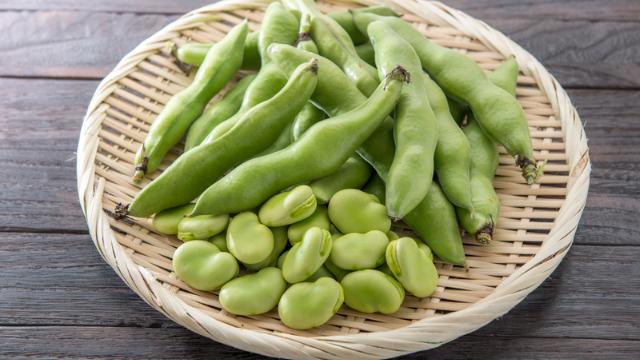Nutrient-Rich: Broad beans are packed with essential nutrients including protein, fiber, folate, manganese, copper, phosphorus, and iron. They are also rich in vitamins such as vitamin K, vitamin B6, and vitamin C.
Heart Health: The high fiber content in broad beans helps to lower cholesterol levels, reducing the risk of heart disease. Additionally, they contain potassium, which supports healthy blood pressure levels.
Weight Management: With their combination of protein and fiber, broad beans can help promote satiety, making you feel fuller for longer periods. This can aid in weight management by reducing overall calorie intake.
Blood Sugar Control: The fiber and protein in broad beans help regulate blood sugar levels, making them a suitable food choice for individuals with diabetes or those at risk of developing the condition.
Digestive Health: The fiber in broad beans supports digestive health by promoting regular bowel movements and preventing constipation. It also provides fuel for beneficial gut bacteria, promoting a healthy gut microbiome.
Bone Health: Broad beans are a good source of minerals such as manganese, phosphorus, and magnesium, which are essential for maintaining strong and healthy bones.
Antioxidant Properties: Broad beans contain various antioxidants, including flavonoids and polyphenols, which help protect cells from oxidative damage caused by free radicals, reducing the risk of chronic diseases like cancer and heart disease.
Brain Health: The nutrients found in broad beans, such as folate and vitamin B6, play a role in brain function and may help reduce the risk of cognitive decline as you age.

Iron: Iron is crucial for the formation of hemoglobin, which carries oxygen in the blood to various parts of the body. Adequate iron intake helps prevent iron-deficiency anemia, which can lead to fatigue, weakness, and impaired immune function. Broad beans provide a plant-based source of iron, making them a valuable addition to vegetarian and vegan diets.
Vitamin C: Vitamin C is a powerful antioxidant that supports immune function, helps in the absorption of iron from plant-based sources (like the iron found in broad beans), and contributes to the synthesis of collagen, a protein essential for skin health and wound healing. The presence of vitamin C in broad beans enhances their nutritional value and promotes overall well-being.
High Fiber Content: Just like the beans themselves, the skin of fresh broad beans is rich in dietary fiber. Fiber supports digestive health by promoting regular bowel movements, preventing constipation, and aiding in the maintenance of a healthy gut microbiome.
Vitamins and Minerals: While the concentration may be lower compared to the beans, the skin of fresh broad beans still contains vitamins and minerals such as vitamin C, vitamin K, manganese, and potassium. These nutrients contribute to overall health, supporting functions like immune health, blood clotting, and electrolyte balance.
Antioxidant Properties: Fresh broad bean skin contains various antioxidants, including flavonoids and polyphenols. These compounds help protect cells from oxidative damage caused by free radicals, reducing the risk of chronic diseases such as cancer and heart disease.
Weight Management: The fiber content in fresh broad bean skin can contribute to feelings of fullness and satiety, potentially aiding in weight management by reducing overall calorie intake.
Heart Health: The fiber and potassium content in fresh broad bean skin may help support heart health by promoting healthy blood pressure levels and lowering cholesterol levels, reducing the risk of cardiovascular disease.
Hydration: Fresh broad bean skin contains water, which contributes to hydration. Proper hydration is essential for overall health, supporting various bodily functions including temperature regulation, nutrient transportation, and waste removal.
High Protein Content: Dried broad beans are an excellent source of plant-based protein, making them a valuable food choice for vegetarians and vegans. Protein is essential for muscle repair and growth, as well as various other bodily functions.
Rich in Fiber: Dried broad beans are also high in fiber, which promotes digestive health by preventing constipation, supporting regular bowel movements, and nourishing beneficial gut bacteria.
Nutrient Density: Despite being dried, broad beans retain many of their essential nutrients, including vitamins (such as folate and vitamin B6) and minerals (such as iron and manganese). These nutrients are vital for overall health and well-being.
Versatile Cooking Ingredient: Dried broad beans can be stored for long periods and used in a variety of dishes, including soups, stews, salads, and spreads like hummus. They add texture, flavor, and nutritional value to meals.
Benefits of Fresh Broad Beans:
Vitamin C Content: Fresh broad beans are a good source of vitamin C, an antioxidant that supports immune function, collagen production, and wound healing. Consuming fresh broad beans can contribute to overall health and vitality.
Low in Calories: Fresh broad beans are low in calories but rich in nutrients, making them a nutritious option for those looking to manage their weight or maintain a healthy diet.
Hydration: Fresh broad beans contain water, which contributes to hydration. Proper hydration is essential for overall health, supporting various bodily functions including temperature regulation, nutrient transportation, and waste removal.
Versatility in Cooking: Fresh broad beans can be used in a variety of dishes, including salads, stir-fries, pasta dishes, and as a side dish. They add a fresh and vibrant flavor to meals and pair well with other seasonal ingredients.